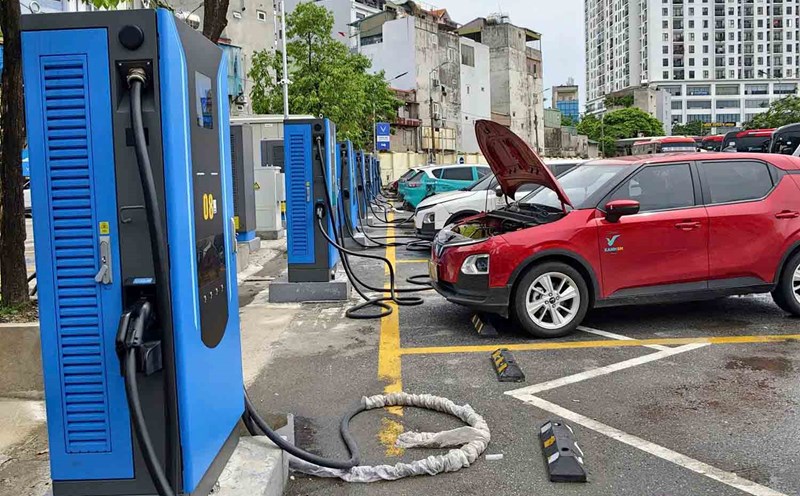Banning electric vehicles is extreme, going against the law
Recently, social networks have continuously appeared with residents' reflections on the fact that some apartment management boards in Hanoi and Ho Chi Minh City have arbitrarily issued notices prohibiting electric vehicles from being parked in the basement.
Sharing with reporters, Mr. Nguyen Hoang Nam (residing in an apartment building in Dong Ngac ward, Hanoi) said: "My family switched to using electric motorbikes because we wanted to contribute to reducing air pollution. However, the management board banned vehicles from being left in the basement, forcing them to park at an outdoor yard hundreds of meters away. Both inconvenient and unsafe when it rains and winds".
From a legal perspective, lawyer Nguyen Thu Trang - Deputy Director of Heva Law Firm LLC - analyzed: Clause 1, Article 144 of the Housing Law effective from January 1, 2025 clearly stipulates that parking spaces in apartments include cars, gasoline motorbikes, electric motorbikes, bicycles and even vehicles for people with disabilities. The charging area for electric vehicles must also be arranged according to construction standards. Therefore, the apartment management board's arbitrary ban on parking electric vehicles is illegal. This regulation violates the legitimate right of use of residents and goes against the State's green transformation policy".
injustice for electric vehicles
One of the reasons often cited for banning electric vehicles is the fear of fire and explosion. However, many international studies and scientific data show that this concern is unfounded. According to research by Auto insurance company ins insurers (USA), internal combustion engine vehicles have a much higher burning rate than electric vehicles. According to this organization, there are up to 1,530 fires per 100,000 gasoline and oil vehicles, while for electric vehicles, the number is only 25. Thus, the burning rate of electric vehicles is only 1/61 compared to gasoline vehicles.
Data from EV FireSafe (Australia) - the unit that tracks electric vehicle battery fires worldwide - also shows that from 2010 to mid-2023, only 393 electric vehicle battery fires were recorded out of a total of about 30 million vehicles in circulation. Meanwhile, gasoline and oil vehicles recorded a rate of fire 20 - 80 times higher.
A report by the Swedish Civil Defense Agency published in May 2023 shows that gasoline and diesel vehicles are 20 times more likely to burn than electric vehicles. In this country, in 2022, there were only 23 fires out of 611,000 electric vehicles (0.004%), while more than 4.4 million gasoline and oil vehicles had 3,400 fires (0.08%).
Experts also explained that electric vehicles use lithium-ion batteries, which are designed with multiple protective layers such as liquid cooling systems, separation walls, heat sensors and electrical insulation technology. These measures significantly reduce the risk of fire and explosion compared to gasoline fuel systems, which are prone to fire when encountering fires.
It can be seen that banning electric vehicles from being left in apartment buildings is not only an extreme action but also a violation of the 2025 Housing Law. This is an imposition that directly affects the legitimate rights of residents.
In the context of Vietnam promoting green transformation, towards clean transportation, such an camori is going against the trend. Instead of banning, apartment buildings need to comply with construction standards, arrange standard charging areas and improve fire prevention and fighting. That is the right approach, ensuring the safety of residents while still respecting their legitimate rights.








